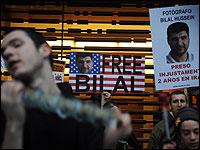Transcript
BOB GARFIELD:
And now an update: As we've reported on this show, Associated Press photographer Bilal Hussein has been held by U.S. authorities for two years on no particular charges beyond allegations that he had ties to Iraqi insurgents. His photographs were so up close and personal that critics felt he must be up close and personal with the insurgent subjects.
But no evidence has been brought forth, and this week an Iraqi judicial committee announced its decision to drop legal proceedings against Hussein, ordering the journalist to be freed.
According to the Committee to Protect Journalists, it's not clear whether the U.S. authorities will release him or invoke a U.N. mandate that could allow them to continue holding him as a security risk.
AP executive editor Kathleen Carroll told us in 2006 that Bilal seems to be regarded by the U.S. military as guilty by association.
KATHLEEN CARROLL:
Bilal grew up in Fallujah. I don't know about you, but not all the people that I grew up with turned out exactly well, you know. Some of them ended up doing things that our mothers might not like.
I don't know whether that's the case with Bilal because we've never had any names associated with this. Just – they think his relationships are unsavory.
Any journalist will tell you that occasionally you end up having dinner with or interviewing or taking pictures of somebody that you might not want to have over to the house. But that's a part of your job as being a journalist.
How could anybody in Boston, Chicago, New York or Philadelphia have covered the Mob if they didn't get to know all these colorful characters a little bit? Does that mean that they should go to jail without charge because they hang out with guys that have names from The Sopranos?
BOB GARFIELD:
We don't even know the accusation, much less the truth, in the Hussein case. On the right-wing blogosphere, speculation abounds that he was not only a collaborator with the insurgency but a mole planted in the AP to influence Western coverage of the war.
But let's assume his motivations and actions were simply journalistic, to exploit his sources in the insurgency to get dramatic pictures of dramatic events. Still, ethical issues arise. Reporters are supposed to be, above all else, neutral observers, but they're also expected, under certain circumstances, to save human life at the expense of a story. Do you snap the picture or pull the wounded soldier to safety?
And if the answer is saving the soldier, then would a reporter with advanced knowledge of a violent assault be obliged to warn its intended victims? Maybe.
But in saving lives, he or she would have become a spy, putting all others journalists under suspicion. And if the reporter were an American providing information about pending American military action to the enemy, he or she would most likely be deemed a traitor.
In an upcoming program, we will be examining the conflicting values behind these ethical questions. But in the meantime, we ask you to whom and what should a reporter be loyal? To one's news organization? To the story? To the audience? To one's country? To one's fellow man?
Leave your comments at Onthemedia.org under the headline Battlefield Ethics.
